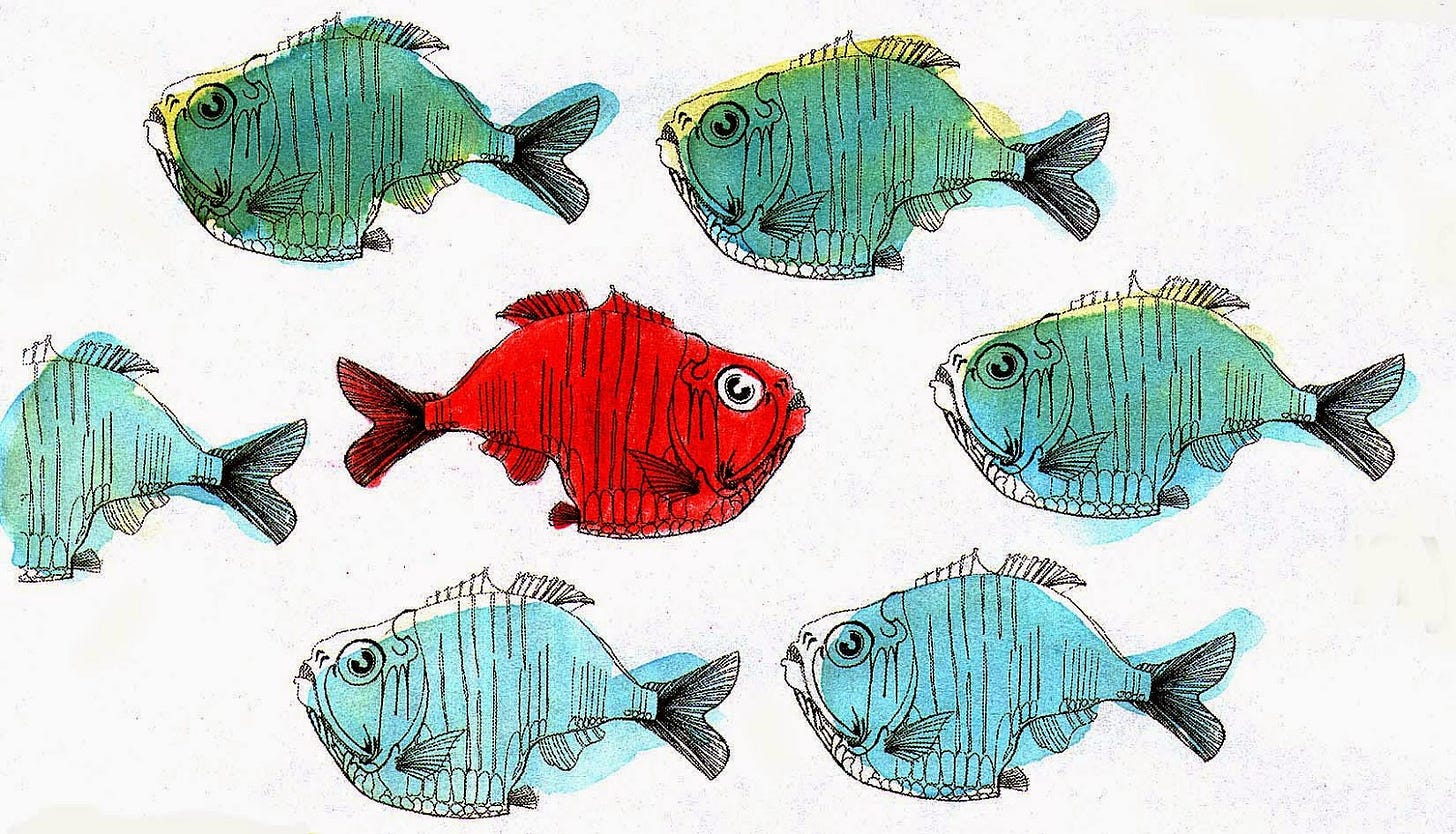Embracing Pain and Discomfort: The Crucial Path to Deepening Your Faith
Why pain, discomfort and even suffering are your greatest ally for spiritual growth
What discomfort does your love of God require? How and why might we embrace struggle in an age of ease and avoiding pain and suffering?
Science shows that pain and discomfort are the most potent catalysts for all learning and growth. This article explores the implications of this truth for spiritual formation and provides a critical practice that we can all engage in to harness the power of this reality.
The Easy Way or The Hard Way?
In The Matrix, Keanu Reeves's character gets a computer plugged into his brain. With a push of a button, martial arts skills are downloaded into him. He opens his eyes and delivers one of the film's most iconic lines: “I know Kung Fu.”
How many of us dream of instantly downloading new skills and understanding, bypassing years of frustration and messy growth? Instead, learning is a gradual, challenging process full of hard work and frustration, even when we know what we are doing.
We are obsessed with speed, convenience and, most of all, avoiding struggle and discomfort. We often want to be entertained more than challenged. But the truth is this:
Learning happens at the point of challenge.1
Struggle is powerful. Research in cognitive psychology shows that struggle is necessary for deep growth and development.2
The easy and comfortable is very ineffective. It’s why we can:
Believe that difficulty, unpleasantness, and struggle is a sign of something wrong in our spiritual growth
Regularly attend a worship service customised to how we like it and never really see any growth in our faith
Think that stopping attending a worship service and doing something else we enjoy will lead to better spiritual growth
Always give in to comfort and opt out of opportunities for faith growth, using alibis of being too tired, telling ourselves the lie of delay - maybe next week/month/year
Deep learning, growth, and formation, in all of life and especially with God, require discomfort, struggle, pain, and sometimes suffering.
Reframing Pain and Discomfort
And our predicament is getting worse. Take writing, for example. AI writes papers for students, copy for editors, and text for authors. In doing this, we risk not understanding what was written for us and losing something vital in the struggle of writing—something the labour of writing creates in us that fails to come into being. We fail to become writers because the struggle to learn to write creates writers. More and more, we expect growth to be on-demand and effort-free.
Christians in history have discovered something science has recently discovered to be true. Pain and struggle are not optional in learning. The story of the Prodigal Son demonstrates many things, including pain and learning. We see what happens to a young man who wants a life without waiting, pain, and sacrifice. Only in entering into the reality of his eventual destitution and through pain does he arrive at what he was looking for all along.
Scripture repeatedly directs us not to avoid pain and struggle; otherwise, such things will eventually find and overcome us. We reap what we sow, and a life of avoidance will always catch up with us. Instead, we are encouraged to:
Pick up our cross daily
Persevere in struggles and suffering
Be joyful in trials
Participate in the sufferings of Christ
The Dessert Fathers practised an asceticism that seems rather extreme - having no possessions, fasting, prayer and solitude.
Asceticism comes from the Greek word askesis, which is the Greek word for “training”, like athletic training — askesis is the word St Athanasius uses to describe the lifestyle and path of St Antony the Great. It is, then, more like “spiritual training” than hatred of the body. However, the entire human life is lived in the body.3
The Dessert Father's asceticism was about many things, and we can mistake it as an unhealthy denial and abuse of the body to achieve mystical experiences. A better way to grasp what they undertook was their overwhelming desire to encounter God—a desire so strong that they went without anything to make them comfortable, which might have substituted for their relationship with God.
Most of us are not called to such asceticism, but we are invited to consider what comfort we will do without and forgo for our relationship with God.
What discomfort does your love of God allow for and demand? What discomfort would you deliberately endure to become more like Christ? Pain and discomfort can be the most important signals that we are leaving our comfort zone and are at a growth threshold with God.
Beyond Neuroscience: A Spirituality of Participation
Neuroscience, behavioural science, and psychology are discovering more and more about how struggle, challenge, and responsibility are necessary for activating and accessing dimensions of human development for meaning, purpose, health and well-being.
It’s as if all these processes reveal something encoded in humans at every level of our being, from our DNA to our psychology. That the way to a better human life is a cruciform life, where something in us has to die to experience new life. All fallen human beings carry within them the broken image of God and pathways of activation by cruciform behaviours and practices.
Scripture repeatedly tells us that the cruciform life is the only true Christian life. We should not be surprised that this life is evidenced in human growth and formation science.
The cross is not only the source but also the shape of our salvation, and cross-shaped living (cruciformity).4
Cruciformity is theoformity and theosis. In other words, to become Christlike is to participate in and recapitulate the Christ Event, i.e., retell the life, death, and resurrection of Jesus with our lives. Participating by the Spirit in the Christ Event brings Christ’s resurrection life to us.
Growth and transformation occur in formation that brings us to the end of ourselves—facing imposter syndrome, cognitive fatigue, insecurity, and being stretched into uncomfortableness. This is how death and resurrection work within discipleship: to come to the end of myself and die little and, at times, suffer more significant deaths to experience resurrection.
One Key Way to Embrace the Pain of Learning and Growth
Agere contra is an Ignatian concept that you might not have heard of. The term means ‘to act against’ behaviours and dispositions that are not life-giving and cause us unfreedom in our life with Christ.
We can be attached to patterns of behaviour that seemingly make us feel safer, be they our insecurities, doubts, or unwillingness to be pulled out of our comfort zones. They prevent us from living our lives fully in the way the Lord intends. When we live our lives in Spirit and in Truth, we live in a true freedom. Agere contra helps us to confront those things that hold us back from such freedom; better yet, it helps us to grow into this freedom.5
Our aversions to discomfort can make us feel safer, but they are false attachments that prevent us from being open to the pain required for growth. The good news is that we can act and move against self-destructive attachments to comfort and ease. The first step is to notice when our attachments to comfort have taken hold of us and are causing us to move away from a life of growth in faith and Christ.
This noticing itself is uncomfortable.
Pause and think about what you often or nearly always defer due to tiredness, business, and fatigue. Yet, at such times, you might notice how you can readily make the time for other, more comfortable things.
Is it that prayer meeting that would be good to go to, but you are so tired, maybe you’ll catch the next one? As you notice your tiredness and movement away from the prayer meeting, instead act against it. Use the tiredness as an excuse and reason to go to the prayer meeting. Discover the freedom of meeting God in prayer in the face of your tiredness and see what resurrection life might follow along. Put your tiredness to death and take it to the cross.
When you think the Lord has spoken to you about something, and you delay taking action, notice your delay and the reasons you make for that. Maybe there is no reason other than habit. Instead, act against that, take action against your unfreedom, and see what has to die in you to do this - insecurity, habit, ego, etc. Resurrection is close behind!
Where else have the things of God for your life become optional lifestyle choices? Take the time to list what you know would be better for you, that you have some flicker of desire for, but your unfreedoms keep you from doing it. Then, explore how you might act against them.
Again, why bother? Has what is available to us in Christ captured your deepest desire? Do you long for and want the fullness made available to us in Him?
Colossians 2:9 For in Christ all the fullness of the Deity lives in bodily form, 10 and in Christ you have been brought to fullness. He is the head over every power and authority.
If you do not desire a Christ-filled life and are content with your current identity in God, stay as you are. But if you have caught a glimpse of who you might be in Christ, act, move, and fight against the addictions to comfort, ease, and avoidance.
1 Cor 9:26 Therefore I do not run like someone running aimlessly; I do not fight like a boxer beating the air. 27 No, I strike a blow to my bodyand make it my slave so that after I have preached to others, I myself will not be disqualified for the prize.
Discover the excitement of acting against your unfreedom, noticing the discomfort, fears, and alibis, and see them all taken to the cross of Christ to be put to death so that you can claim:
Galatians 2:20 I have been crucified with Christ and I no longer live, but Christ lives in me. The life I now live in the body, I live by faith in the Son of God, who loved me and gave himself for me.
In doing so, you align your whole being with how God created you to experience death and resurrection.
Find Company: Effort is more manageable with others
Facing discomfort becomes possible and more agreeable with the company and support of others. Slipstreaming with those acting against and moving towards Christ is the intelligent way to catalyse your growth. It is why much of our attachment to comfort will be about not being with those acting against their discomfort. Notice the places and things we avoid due to attachment to comfort and our alibis about struggle - it is likely often with those acting against their discomfort.
Others growing and moving towards Christ produce a wake around them that washes over us if we get close enough to them of Christ's life, death, and resurrection. Being in the presence of those pursuing Christ can be exhilarating and profoundly disorienting. But such Christ followers become new friends who help us recalibrate our measures for life and faith, who know that struggle is mighty and comfort is cheap. Embracing the discomfort necessary for the encounter with God will never disappoint.
So what’s it to be? The easy way or the hard way? What discomfort does your love of God allow for and demand?
Ritchhart, Ron, Mark Church, and Karin Morrison. Making Thinking Visible. Chichester, England: Jossey-Bass Wiley, 2011.
Bjork, R. A. (1994). Memory and metamemory considerations in the training of human beings. In Metacognition: Knowing about knowing (pp. 185–205). MIT Press.
Matthew Hoskin, https://thepocketscroll.wordpress.com/2022/09/02/protestants-and-the-desert-fathers/, accessed 25th November 2024.
Gorman, Michael J. Participating in Christ. Grand Rapids, MI: Baker Academic, 2019.
Edmund Lo, S.J, at http://www.ibosj.ca/2014/04/agere-contra-why-go-opposite-way_2.html, accessed 25th November 2024.







